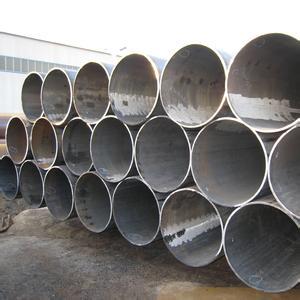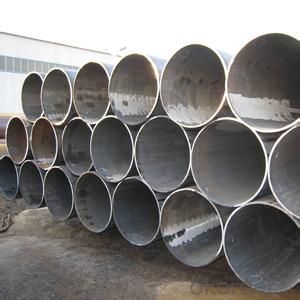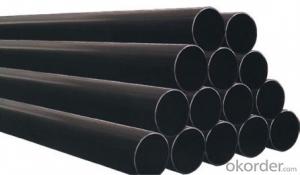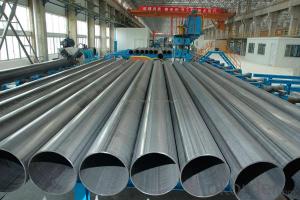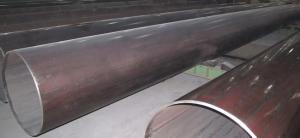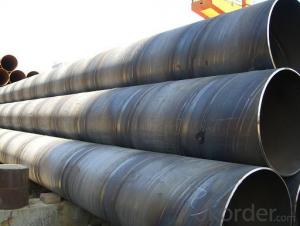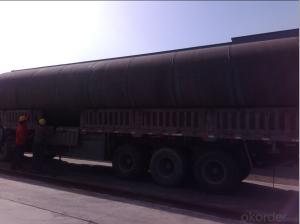32''-48'' CARBON STEEL LSAW WELDED PIPE API/ASTM/JIS/DIN
- Loading Port:
- Tianjin
- Payment Terms:
- TT OR LC
- Min Order Qty:
- 5 m.t
- Supply Capability:
- 300 m.t/month
OKorder Service Pledge
OKorder Financial Service
You Might Also Like
Packaging & Delivery
Packaging Detail: | standard export packing or as customer's requirement |
Delivery Detail: | within 10 - 30 days |
Specifications
Spiral Welded Steel Pipes and Tubes
1.Material:Q195-Q235
2.Length:1-12m
3.WT:1.0-14mm
4.O.D.:20-273mm
Product Description:
1.Material : Q235,Q345,L245,L290,L360,L415,L450,L485,GrB,X42,46,X52,X56,X60,X65,X70,X80,X100
2,Standard: SY/T5037-2000,GB/T9711-2011,API Spec 5L PSL1/PSL2,ASTM A252\A53,ISO3183,DIN17172,EN10217,JIS G3457,AWWA C200,ASTM A139,ASTM A671,ASTM A672
3.Wall thickness: 3.0mm-30mm
4.Outer diameter: φ168mm-3020mm
5,Length: 5m-12m or as your requirement
6,Corrosion protection standard: DIN30670,DIN30671, AWWAC210, AWWA C203, SY/T0413-2002,SY/T0414-2002
7,Application: Oil, gas, natural gas, water pipe, thermal electricity pipe, steel structure engineering, etc
Q195-q345 Material Steel Pipe's Materials
Elements | Chemical Compsition% | Mechanical Property | ||||||
C% | Mn% | S% | P% | Si% | Yield Point (Mpa) | Tensile Strength(Mpa) | Elongation | |
Q195 | 0.06-0.12 | 0.25-0.50 | <0.050< span=""> | <0.045< span=""> | <0.030< span=""> | >195 | 315-430 | 32-33 |
Q215 | 0.09-0.15 | 0.25-0.55 | <0.05< span=""> | <0.045< span=""> | <0.030< span=""> | >215 | 335-450 | 26-31 |
Q235 | 0.12-0.20 | 0.30-0.70 | <0.045< span=""> | <0.045< span=""> | <0.030< span=""> | >235 | 375-500 | 24-26 |
Q345 | <0.20< span=""> | 1.0-1.6 | <0.040< span=""> | <0.040< span=""> | <0.55< span=""> | >345 | 470-630 | 21-22 |
Packaging & Delivery
Packaging Detail: | Normal exporting packing,in container or bulk vessel or as per clients' request |
Delivery Detail: | 2 months after confimed contract |
Specifications
Large Diameter API 5L X70 PSL2 LSAW Steel Pipe
Grade: X42, X46, X50, X52, X60, B, C
OD: 1.5"-28"
WT: SCH10-SCH160
Brand:TPCO
Large Diameter API 5L X70 PSL2 LSAW Steel Pipe
Specifications:
u Standard: API 5L
u Grade: B, C, X42, X46, X50, X52, X56, X60, X65, X70, X80
u OD: 1.5"-28"
u WT: SCH10-SCH160
u Length: 5-12m
u Ends Finish: plain end, bevel end, grooved end
u Surface Treatment: bare, black varnished, oiled finish, red color, anti-corrosion, 3PE, FBE or epoxy coating
u Technique: hot rolled or cold drawn
u Application: api 5l steel pipe for conveying oil, water, gas
u Invoicing: based on theoretical weight or actual weight
u Payment Terms: L/C at sight, T/T or Western Union
u Trade Terms: FOB, CFR, CIF
u Certification: ABS manufacturing assessment, ABS design assessment, API 5CT, API 5L, DNV manufacturer certificate, ISO9001 quality management system certificate, ISO14001 environment management system certificate, GB/T28001 occupational health and safety management system certificate, A1 class manufacturing license of special equipment certificate, CCS, GL, LR, SGS, TüV, PDE
- Q: How do steel pipes compare to other materials like PVC or copper pipes?
- Steel pipes have numerous advantages over materials such as PVC or copper pipes. Firstly, their strength and durability make them ideal for high-pressure applications. They can withstand extreme temperatures and resist corrosion, making them suitable for both indoor and outdoor use. In contrast, PVC pipes are weaker and more prone to cracking and breaking under pressure or in extreme temperatures. Although copper pipes are durable, they can be susceptible to corrosion and may require additional protective coatings. Secondly, steel pipes have a longer lifespan compared to PVC or copper pipes. They are renowned for their longevity and can last for several decades without needing replacement. PVC pipes, although relatively inexpensive, have a shorter lifespan and may require more frequent replacement. Similarly, copper pipes can corrode over time and may need maintenance or replacement. Another advantage of steel pipes is their ability to handle a wide range of fluids and substances. They are commonly used in industrial applications where chemicals or corrosive materials may be present. PVC pipes, on the other hand, may not be suitable for handling certain chemicals or substances as they can react and cause damage to the pipe. Copper pipes, while generally safe for carrying water, may not be ideal for conveying certain chemicals or fluids. Additionally, steel pipes possess excellent fire resistance properties. In the event of a fire, they can withstand high temperatures and maintain their structural integrity, ensuring the safety and protection of the surrounding area. PVC pipes, however, can melt or deform under high heat, potentially causing structural damage. Although copper pipes are less prone to melting, they can still be affected by extreme heat and lose their strength. Nevertheless, steel pipes do have a few drawbacks. They tend to be heavier and more challenging to install compared to PVC or copper pipes. Additionally, they can be more expensive upfront, especially when compared to PVC pipes. However, considering their durability and longevity, steel pipes may offer better value in the long run. In conclusion, steel pipes provide numerous advantages over materials like PVC or copper pipes. They are strong, durable, resistant to corrosion, and have a longer lifespan. They can handle high-pressure applications and a wide range of fluids, making them suitable for various industrial and commercial uses. Although they may be more expensive and difficult to install, the benefits of steel pipes make them a reliable and cost-effective choice for many applications.
- Q: What are the different methods of pipe coating for steel pipes?
- There are several different methods of pipe coating for steel pipes, each with its own advantages and applications. One common method is fusion bonded epoxy (FBE) coating. This involves heating the steel pipe and applying a thermosetting powder that melts and adheres to the surface, creating a strong and durable coating. FBE coating provides excellent corrosion protection and is commonly used in the oil and gas industry. Another method is liquid epoxy coating. This involves applying a liquid epoxy resin to the surface of the steel pipe, which then cures and forms a protective barrier. Liquid epoxy coating is often used for smaller diameter pipes and provides good chemical resistance. Polyethylene (PE) coating is another popular method, particularly for pipelines that will be buried underground. PE coating involves wrapping the steel pipe with a layer of polyethylene, which provides excellent resistance to water, chemicals, and abrasion. Polyurethane (PU) coating is another option, offering a high level of chemical resistance and flexibility. It is typically used for offshore applications and in environments with extreme temperatures. Other methods of pipe coating include coal tar enamel (CTE) coating, which provides excellent resistance to water and chemicals, and concrete weight coating, which adds weight to the pipe to ensure stability in underwater or subsea applications. In summary, the different methods of pipe coating for steel pipes include fusion bonded epoxy (FBE), liquid epoxy, polyethylene (PE), polyurethane (PU), coal tar enamel (CTE), and concrete weight coating. The choice of coating method depends on the specific requirements of the application, such as corrosion protection, chemical resistance, or stability.
- Q: How are steel pipes used in water treatment plants?
- Steel pipes are commonly used in water treatment plants to transport and distribute water throughout the facility. They are used for various purposes such as conveying raw water from the source to the treatment plant, transporting treated water to storage tanks or distribution points, and carrying chemicals or additives used in the treatment process. Steel pipes are preferred due to their durability, strength, and resistance to corrosion, ensuring the safe and efficient flow of water within the plant.
- Q: Can steel pipes be used for sewage and wastewater systems?
- Yes, steel pipes can be used for sewage and wastewater systems. Steel pipes offer durability, strength, and resistance to corrosion, making them suitable for conveying sewage and wastewater. Additionally, steel pipes can handle high-pressure flows and are often used in larger diameter applications, making them a reliable choice for sewage and wastewater systems.
- Q: How are steel pipes used in the construction of hydroelectric power plants?
- Steel pipes are commonly used in the construction of hydroelectric power plants as they are strong, durable, and can withstand high pressure. These pipes are used to transport water from the dam or reservoir to the turbines, where the force of the flowing water is converted into mechanical energy. Additionally, steel pipes are also used in the construction of penstocks, which are large diameter pipes that direct water from the intake structure to the turbines. Overall, steel pipes play a crucial role in the efficient and reliable operation of hydroelectric power plants.
- Q: Can steel pipes be painted or coated?
- Certainly, steel pipes have the capability to undergo painting or coating procedures. It is a prevalent method employed to safeguard them against corrosion, enhance their visual appeal, or comply with particular industry standards. The process consists of an initial step of diligently cleaning the pipes to eliminate any dirt, grease, or rust. Subsequently, a primer is applied, followed by the desired paint or coating. The selection of paint or coating is contingent upon the envisioned purpose of the pipes. For instance, epoxy coatings are frequently utilized for water or wastewater pipelines, while high-temperature resistant coatings are employed for pipes utilized in industrial environments. In conclusion, the act of painting or coating steel pipes has the potential to augment their resilience and overall performance.
- Q: How are steel pipes inspected for quality control?
- Steel pipes are inspected for quality control through various methods such as visual examination, dimensional checks, non-destructive testing (NDT) techniques like ultrasonic testing, magnetic particle testing, and hydrostatic testing to ensure their structural integrity and adherence to specified standards.
- Q: How are steel pipes used in oil refineries?
- Steel pipes are used in oil refineries for various purposes such as transporting crude oil, refined petroleum products, and other chemicals throughout the facility. They are crucial for the overall infrastructure, including piping networks, storage tanks, and processing units, ensuring efficient and safe fluid flow.
- Q: What are the different methods of wrapping steel pipes for corrosion protection?
- There are several methods used for wrapping steel pipes to provide corrosion protection. These methods include the use of tapes, shrink sleeves, liquid coatings, and powder coatings. Each method has its advantages and disadvantages, and the choice of wrapping method depends on factors such as the environment, the required level of protection, and the budget.
- Q: What are the safety precautions to consider when working with steel pipes?
- When working with steel pipes, it is important to follow several safety precautions. Firstly, always wear appropriate personal protective equipment (PPE) such as gloves, safety glasses, and steel-toed boots to protect yourself from potential injuries. Additionally, ensure that the work area is well-lit and clear of any obstructions to prevent tripping hazards. It is crucial to use proper lifting techniques or mechanical lifting equipment when handling heavy steel pipes to prevent strains or back injuries. Furthermore, be cautious of sharp edges or burrs on the pipes, as they can cause cuts or punctures. Finally, when working with welding or cutting equipment, make sure to follow proper procedures and wear appropriate flame-resistant clothing to prevent burns or fire hazards. Overall, prioritizing safety measures and being aware of potential risks are essential when working with steel pipes.
Send your message to us
32''-48'' CARBON STEEL LSAW WELDED PIPE API/ASTM/JIS/DIN
- Loading Port:
- Tianjin
- Payment Terms:
- TT OR LC
- Min Order Qty:
- 5 m.t
- Supply Capability:
- 300 m.t/month
OKorder Service Pledge
OKorder Financial Service
Similar products
Hot products
Hot Searches
Related keywords
